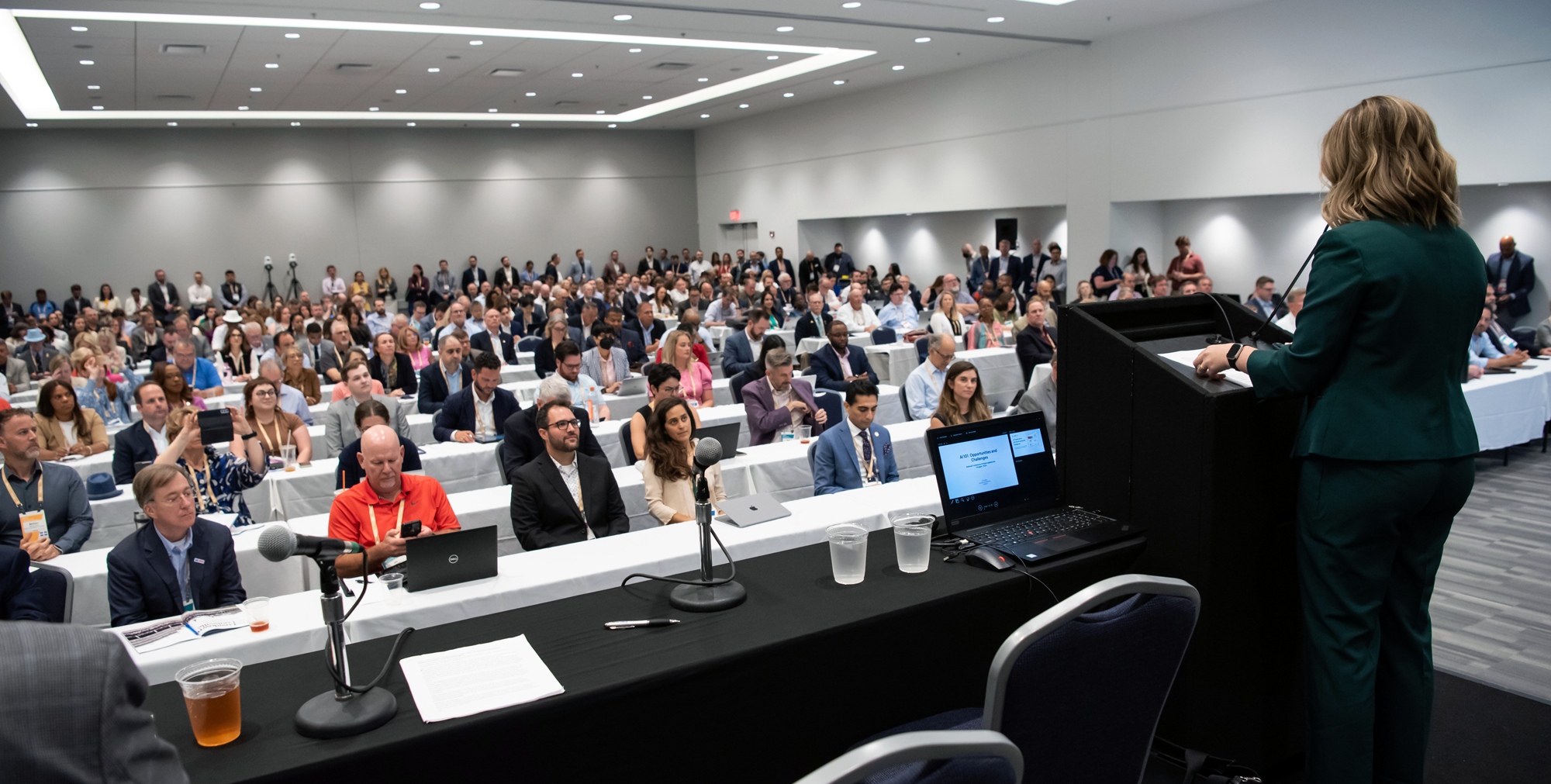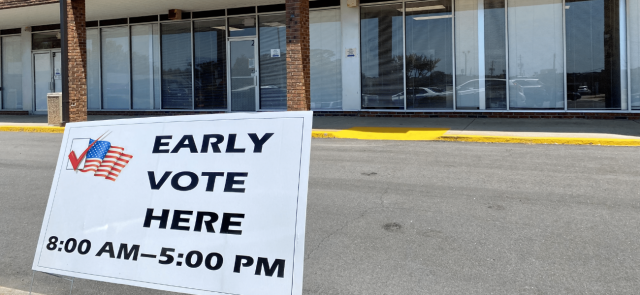Stay ahead of the curve as a political insider with deep policy analysis, daily briefings and policy-shaping tools.
Request a DemoNCSL: Swatting, catalytic converters and redistricting anchor ‘Lightning Round’ session

A panel discusses artificial intelligence issues at the National Conference of State Legislatures' annual meeting in Louisville, Ky., on Aug. 5, 2024. (Credit: NCSL)
- Georgia Sen. John Albers shares his swatting ordeal, urges tougher penalties
- Virginia curbed catalytic converter thefts by eliminating the resale market, Sen. Ryan McDougle says
- Attorneys highlight redistricting challenges in Ohio and New York, caution against independent commissions
Sen. John Albers, R-Roswell, shared how his family was the victim of “swatting,” when someone makes a phony 911 call that results in a response from a SWAT team.
In Albers’ case, an individual called local police for a domestic dispute at the senator’s home when he and his wife were out of the state. Fifteen police officers responded to his home when only his son was there.
“When you have 25 vehicles out on a Code 3, a lot of bad things can happen,” Albers told attendees at the National Conference of State Legislatures summit in Louisville, Kentucky.
Maryland Sen. Cheryl Kagan, D-Montgomery, said each swatting call can cost $15,000 to $25,000.
Albers said several other high-ranking officials in Georgia were also targeted, and earlier this session, the Georgia General Assembly passed a bill to increase penalties.
Maryland passed its version last year, Kagan said, which was controversial because of “challenges with juvenile justice.”
“I call myself a pragmatic progressive, and people on my left were worrying about increasing penalties,” she said. “It’s a challenge, but it’s a crime. We’ve got to make sure people know about it and hopefully that’s part of the disincentive.”
All 50 states have penalties for swatting, but no federal legislation has been enacted. Thirty-three states have some level of felony penalty, usually when causing injury or death. Twenty-one states provide the ability to seek restitution for costs incurred.
Catalytic converters
Virginia tackled rampant catalytic converter thefts not by going after the perpetrators but by eliminating the market, Senate Minority Leader Ryan McDougle, R-Hanover, said.
The exhaust emission control devices in motor vehicles were quick and easy to steal and were being sold for $1,500 to $3,500, he told NCSL attendees.
While the parts themselves hold little value, the metals are in high demand, he said.
Addressing the crime as a larceny had evidentiary challenges, so Virginia lawmakers instead focused on the resale market.
“If you weren’t acting for a motor dealer, or scrap metal, if you didn’t have a registration or it wasn’t new, then it’s assumed you were possessing it illegally,” he said of catalytic converters. “After that went into place, it [theft] went from being a scourge to dropping dramatically.”
“It’s an effective tool,” he continued. “It’s not eliminated, but it’s reduced substantially and we’re no longer getting calls in our office like we did before.”
One negative side effect, he said, was that surrounding states saw an increase in catalytic converter thefts because there was no longer a market in Virginia.
The Ohio House in June passed a proposal, HB 328, aimed at curbing catalytic converter thefts. The current version, which awaits Senate action, requires additional record keeping and reporting and imposes a $10,000 to $50,000 penalty on business entities that violate those requirements, among other provisions.
Redistricting
Attorneys involved in Ohio’s and New York’s redistricting litigation explained the challenges faced in their respective states and how other states have handled redrawing their maps.
Frank Strigari, former chief legal counsel for the Ohio Senate, noted that Michigan has faced significant issues since a newly established independent commission was put in place.
“Basically, the people that were on that commission didn’t have any experience,” he said. “Their system was meant to be that way, but because they didn’t have experience, they had to rely on experts, consultants and all types of people, which, you can imagine, come with all sorts of partisan agendas.”
Ohio voters will decide whether to establish a similar body in November following a heavily litigated process.
“In Ohio and New York, we didn’t have the greatest success, even with well-intended reforms,” Strigari said. “I don’t know if there’s really, truly a panacea for this type of issue, especially when politics are involved. You can try to take the politics out of it, but it’s impossible to do that.”
He said it is his personal opinion that redistricting should remain in the hands of state legislatures and advised against placing the process within state constitutions.
“You’ll just constantly change the state constitution to try to make the process perfect, but it will never be perfect,” he said. “It’s not a good idea.”
Strigari and Jeff Wice, special counsel to the New York Legislature, advised lawmakers to begin planning now for the 2030 Census by making updated data easily accessible for constituents and thinking about the future system for public input and maps.
Krista Kano is a staff writer for Gongwer Ohio/State Affairs. Reach her at [email protected] or on X @krista_kano.
Weekend Read: New school buses arrive spring ’25; schools grapple with bus driver shortages
The Gist Georgia has ordered 256 new school buses to relieve the aging fleets in public schools around the state, but most of those new buses won’t be on the road until the end of this school year. What’s Happening “We’ll be looking at springtime before those buses start rolling,” said Ken Johnson, pupil transportation …
Mega Millions has generated over $17M in HOPE, pre-K funding since June
By now you’re acutely aware you’re not holding the winning ticket to this week’s $810 million Mega Millions Jackpot. That honor goes to a Texan who matched all six numbers. Take solace, though, knowing your weekly spending on lottery tickets in Georgia helps preschoolers get an early educational start and pays students’ way through college …
Presidential race aside, what’s at stake for Georgians in the November election?
The Gist Despite all 236 members of the state House and Senate up for reelection in November, the presidential race has taken center stage in Georgia with the nomination of Vice President Kamala Harris for U.S. president. Nonetheless, Georgia Democrats will be in a push-and-pull contest to gain more seats in both the House and …
Election administrators ‘in limbo’ over new voting rules, top official says
If you plan to hand-deliver your absentee ballot to your local election office this year, you’ll have to show identification and sign a form stating whose ballot you’re dropping off, under a new rule recently passed by the State Election Board. If you fail to show your ID or don’t complete the form, your ballot …




